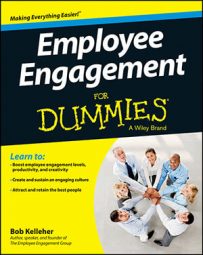Compensation is one good tool to use to encourage achievement and employee engagement. Here are a few tips that pertain to developing your compensation strategy:
Communication about rewards must be frequent and transparent. The distribution of rewards for high performance should not be kept secret. For example, if John is being given a plum assignment to reward him for his high performance, others should be told why John received the assignment. Ditto if Mary is being promoted to head up the chain's largest store.
After all, you want people to strive to achieve, and to recognize that those who do achieve are rewarded. That said, organizations should not share specific dollar amounts. That is, if Mary also earns a cash bonus for her efforts, the dollar amount of that bonus should be kept private.
Consider tenure and staff level. The more junior a person is, the less his compensation should depend on overall company performance. Instead, it should relate more to achievements within a team or department or business unit. For senior employees — think executives and managers — the link to overall company performance should be much more explicit.
Correlate compensation and bonuses with the employee's potential to grow and learn. A satisfied employee doing a decent job who shows no interest in advancement or training should eventually “max out” her salary. In other words, it may not be in the company's best interests to continue investing in that person. In these instances, bonus or variable pay is the more appropriate incentive to maintain that “C” level of engagement.
Avoid greasing the squeaky wheel. You know the type. The loud Little League parent who always manages to get his marginally talented kid on the all-star team. The whiny diner in the booth behind you who gets her meal for free.
Sadly, these squeaky-wheel types are all too familiar — and are all too common in business. As a manager, avoid giving in to the employee who is always complaining about something, even if giving in feels like the easier thing to do.
Your other employees are watching! The last thing you want is to train your entire staff to be a pain in your behind by consistently rewarding that one squeaky wheel!
Do not overpay. In some situations, like when it comes to your superstars, paying above market rate is a good thing. But for the other 90 percent of your employees, you should target your base pay at the market rate (although you can vary pay to some extent to reflect differentiations in performance).
On a related note: If you're looking to really annoy (read: disengage) your employees, then go right on ahead and pay a new hire who has the same skills and tenure as your incumbents more than your existing staff. Nothing will irritate employees more than finding out the “new kid” earns more than they do! That type of unfairness will quickly extinguish your employees’ engagement.
Hot markets and sectors should be rewarded with variable pay whenever possible. A good approach is to offer the in-demand talent a “project premium” amount for the duration of the project. This way, their base compensation is equitable with other divisional staff when the project ends.
They also won't feel as entitled to this premium, compared to what showed up as part of their base salary. No market stays hot forever.
Don't confuse rewards and recognition. Rewards should be reserved for something significant: a promotion, a year-end bonus, the quarterly bonus for new orders, and so on. In contrast, recognition should be reserved to highlight an event, an episode, or something above and beyond.
You risk disengaging a deserving employee if you reward year-end performance with a $50 American Express gift certificate, which would be far more suitable to recognize an employee's above-and-beyond efforts in assembling a new committee.
Think of it this way: Rewards should be somewhat substantial; recognition should be more symbolic. In other words, with recognition, the point is your acknowledgment of the employee's hard work, not the value (if any) of the award itself.
On a related note, don't confuse recognition with a simple thank-you. They're two different things. A thank-you is to show appreciation for the norm. Recognition should be reserved for when someone goes above and beyond. If you over-recognize the norm, you tend to cheapen the spirit of recognition.
Be fair (not to be confused with being equal). Although money is not a primary engagement driver, it can certainly disengage staff if they feel they're being rewarded unfairly compared to others in their group (internally to the company or externally to the market).
One more thing: Some people in select industries may be highly motivated by money. Examples include the doorman in your hotel lobby, who enthusiastically helps you with your luggage, and the waitress at your favorite restaurant, who consistently delivers your meal with a smile.
For these people, the behavior/reward cycle is almost immediate and, therefore, quite powerful. In my experience, however, these occupations are the exceptions. For the vast majority of people in the vast majority of occupations, a more critical driver is achievement.

